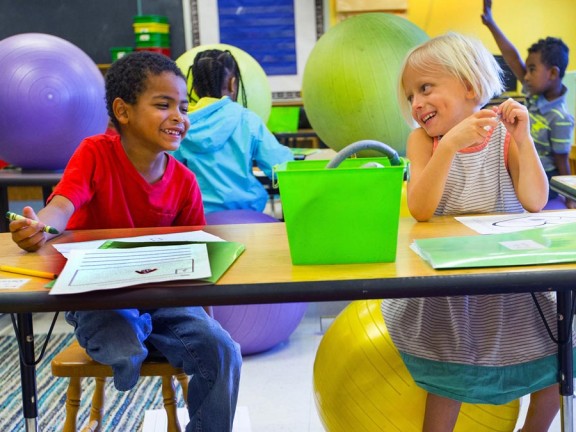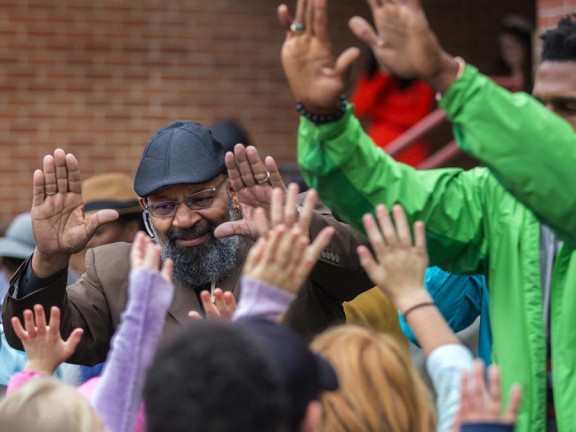The education beat is a natural fit for solutions journalism — rigorous and compelling reporting on the responses to social problems. That’s because many of the major story lines in education are about how to fix its problems: achievement gaps between rich and poor students, unequal access to higher education, high suspension rates, low graduation rates, the mediocre performance of American students on international tests – the list goes on.
In K-12, reformers, teachers unions, parents, politicians and pundits battle over the ideas they think will work best to close gaps and improve performance: Higher standards? Stricter accountability? An iPad for every child? Privately run charter schools? Smaller class sizes? More funding? Better training for teachers? More social and emotional learning?

And in higher education—where tuition rises quickly while graduation rates only increase incrementally—ideas for improvement burst into the limelight with great fanfare, but often languish: Online courses open to all? Free community college? Competency-based credit?
Education reporters can find themselves wading through competing claims about success and failure. Adopting a solutions lens – digging into the evidence and explaining how various responses work, or don’t work – can help journalists navigate these debates, bring fresh angles to their reporting, and go beyond the political fights that dominate education news.
An example: As the debate over the Common Core standards reached a fever pitch in the 2014-15 school year, a pair of Hechinger Report writers took a look at New York State, where the new, harder Common Core tests were fueling a revolt among teachers, parents and students. The political fight had been well covered in the local and national media. So the writers asked a different question: Are there any schools that are doing better than expected on the new tests?
A data analysis turned up a small, working class district in upstate New York where teachers and parents had been skeptical about the standards at first. Educators there had tried a variety of methods to meet the new expectations, though, including “going rogue” on the state education department’s plans for the Common Core roll out, and – counter-intuitively – ending test prep, deciding not to spend the days and even weeks that many schools currently use to give practice exams and teaching students test-taking strategies.

The story of their relative success included examinations of the school’s struggles along the way and its remaining shortcomings. It was a hit with readers, and it earned praise from educators and experts who were thankful both for a fresh angle in the Common Core story line and for an article that provided lessons others might put to use as they dealt with the reality of the new requirements.
Solutions stories shouldn’t replace all or even most traditional education reporting; they complement it. School board meetings, Congressional hearings, test score results, financial mismanagement, superintendent searches, teacher-of-the-year features, along with first-day jitters and graduation day stories are the bread and butter of the beat.
But a solutions lens helps journalists fulfill an important responsibility of the education beat: helping the public understand which ideas, plans and programs hold real promise for fixing the array of problems in schools, and revealing the real-world challenges involved in changing mindsets and behaviors or institutions and systems.
Reporters can use the tools of solutions journalism to analyze innovations and discover established education models that might be replicated or adapted elsewhere. A solutions framework can also bolster a journalist’s efforts to hold public officials, institutions and schools accountable: If there’s evidence an idea is working elsewhere, why hasn’t it been tried here? On the flip side, using solutions journalism methods allows reporters to draw a realistic picture of a program’s promise and its shortcomings. It also helps them see patterns in why some ideas succeed and why some fail, and the key role that failures often play in driving better ideas.
For a local reporter on the education beat, a solutions approach might turn up a story about a literacy program in a district school that has improved reading skills and could be scaled up to other area schools. Or it might lead a reporter who is investigating racial disparities in discipline rates in the local schools to write a story about a district in another county or state that has successfully reduced those disparities. For a national reporter, a series of stories on how the rising cost of college has increased barriers for lower-income students might be complemented by a solutions story about an institution that found a way to increase its share of low- income students. Or “positive deviant” research might turn up a district with an unexpectedly small achievement gap between whites and Hispanics – leading to a story about how the district’s efforts could yield lessons for other states and districts where the gap has stagnated or grown.
In this guide, produced in partnership with The Hechinger Report, we’ll explore how education journalists can use solutions journalism to enhance their coverage of the beat with concrete reporting tips and potential avenues of inquiry. We’ll explain some of the most urgent challenges facing schools, pointing to opportunities for high-impact solutions reporting. We’ll also look at the tricky landscape of education data, and how journalists should search for and treat evidence when researching a solutions-oriented story. And we’ll walk you through actual solutions stories about schools – and hear from reporters and editors who are already using a solutions framework regularly in their work.
You’ll find links to additional resources throughout this guide – and you can explore more at the solutionsjournalism.org.